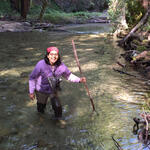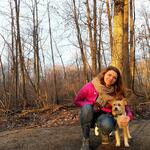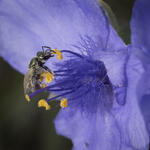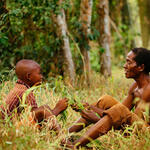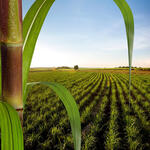- Date: 31 March 2022
For our Rising Stars series, we're featuring the next generation of leaders who are working toward a more sustainable world. We recently spoke with Mitsuko Wong, Director of Sustainability, Product and Supply Chain at Ralph Lauren to learn about her role, what she finds most challenging and rewarding, and more.
- Date: 30 March 2022
- Author: Anukampa Freedom Gupta-Fonner, CEO, Spring
I was the first girl child to be born in my father’s family after 40+ years. In more ways than just that, I broke the mold.
I grew up in a community, in a part of the world, where spotting a single tree was a sight to behold. Growing up was an experience that was dense, crowded, loud and polluted. Wildlife sightings in the community were limited to pigeons, cows and eagles. Even as a five-year-old, I was yearning to get close to Earth. My parents made special efforts to take me to the nearest available parks, scant as they were. I so loved trees that I named my two favorite trees "Camel" and "Elephant."
Then, somehow, as a stroke of luck, I came across this wacky man by the name of Steve Irwin. To me, as a five-year-old, he fired my imagination. I was glued to his “Crikey!” catchphrase and would watch in sheer awe the wonders of wildlife. It came to such a head that I was called “Animal Planet” by all my cousins. My never-ending queries about the natural world, and really everything else, earned me the name “question bank.”
That’s when I knew I wanted to do something in the natural world. Life is not a straight line. It took a circuitous journey to truly understand how my love and passion for God’s green Earth could be expressed in the form of a career.
- Date: 28 March 2022
For our Rising Stars series, we're featuring the next generation of leaders who are working toward a more sustainable world. We recently spoke with Simone Emilie Gourguechon, Director, Global Sustainability & ESG Strategy, at McDonald’s Corporation to learn about her role, what she finds most challenging and rewarding, and more.
- Date: 25 March 2022
- Author: Devon Leahy, Vice President of Sustainability at Ralph Lauren and Nicole Tanner, Freshwater & Food Transformation Manager, World Wildlife Fund
Hidden water is water that is not felt or seen in final products, but is required for almost every step of the production process. The water footprint of textile and apparel companies includes freshwater use throughout the phases of clothing production from growing cotton or other materials, to manufacturing and finishing the final garment. Therefore, water use needs to be effective and efficient across the value chain. By working to uncover where water is hidden within the value chain, the partnership between Ralph Lauren and World Wildlife Fund (WWF) is finding innovative ways to decrease water-related risk, preserve the resource, and benefit the environment and local communities.
- Date: 22 March 2022
For our Rising Stars series, we're featuring the next generation of leaders who are working toward a more sustainable world. We recently spoke with Erika Meschkat, Senior Analyst, Sustainability, at The J.M. Smucker Co., to learn about her role, what she finds most challenging and rewarding, and more.
- Date: 16 March 2022
- Author: Kari Armbruster, Kroger
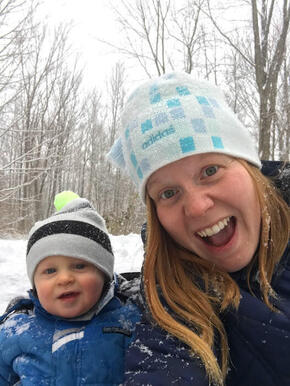
My career at Kroger began in 2013. At that time, very few companies had begun to formalize their strategy on “sustainability.” Kroger was only one year in to having a full time employee leading the function and she was a team of one. I came into the corporate affairs department as a specialist designed to help manage projects for several different functions including sustainability and corporate philanthropy. My background was in politics and campaigning, so corporate social responsibility was brand new to me.
Looking back, I am so thankful that I came into Kroger at that time. Being a part of the development of a full scale sustainability strategy and the redevelopment of our social impact work was truly groundbreaking for me. There are two points in my life that I can look back on and realize that I lost myself in a passion for work: The first was in college on my first political campaign; the second was in the development and launch of Zero Hunger | Zero Waste.
- Date: 12 March 2022
- Author: Clay Bolt, Senior Communications Lead, Northern Great Plains Program
North America’s grasslands are one of the least protected and most at-risk biomes on the planet, and as the grasslands disappear, so do the critical ecosystem services they provide. During the last decade, over 2 million acres of grasslands were plow-up to make way for croplands across the US and Canadian Great Plains. This is a rate of habitat destruction that’s comparable to the clearing of the Brazilian Amazon, and it’s occurring in our own backyard.
In 2021, to combat this loss, World Wildlife Fund (WWF) launched an exciting new three-year partnership with Air Wick® called “One Square Foot.” The partnership’s mission is to reseed 1 billion square feet (~23,000 acres) of previously disturbed grasslands and wildflower habitats in the Northern Great Plains (NGP). Wildflowers are not just beautiful: they provide food and shelter for pollinators, grassland birds, and many other species that are native to the region. In our first year, despite on-going drought conditions across the NGP, WWF’s Sustainable Ranching Initiative was able to reseed nearly 51 million square feet of wildflower and grassland habitat.
For year two of the partnership, we hope to create even greater awareness about the importance of grasslands and wildflowers through a campaign extension of One Square Foot called the “Super Bloom.” In nature, a Super Bloom is when millions of wildflowers bloom at once, carpeting a landscape in color as a response to a period of late winter or early spring rains. Beginning on March 12th, WWF and Air Wick® aim to create a Super Bloom by planting a record-setting number of native wildflower seeds —and we want you to join us. From March 12th through June 1st, 2022, if you share any wildflower to Instagram, Facebook, Twitter or Pinterest—a photo, a video, an illustration (any wildflower counts)—we will plant one square foot of wildflowers in the Northern Great Plains as a thank you, and to help further restore this important habitat. Just tag your posts with #SquareFootSuperBloom and share them to your feed. It’s that simple!
To learn more about the “One Square Foot” initiative and the wildflowers that are native to your part of the US, please visit our project webpage.
- Date: 10 March 2022
- Author: Craig Beatty, Manager, Forests Research & Strategy, WWF
For millions of us, a walk in the woods changed from a pastime to a necessity during this pandemic. It’s about as safe and socially distanced as can be, and access to forests has often helped ease my mind. After being indoors for days on end, forests became a place where I could escape and unwind. Spending time in forests makes me feel better. But what’s the science behind that, and could forests be doing more for our health?
- Date: 15 February 2022
- Author: Alix Grabowski, Director, Plastic and Material Science, WWF
We all know that plastic waste is a global crisis, but how often do you think about where plastic comes from?
Of all new plastic, 99% is made from fossil fuels like oil and natural gas, meaning the plastic that we use today starts trashing our planet long before it becomes trash. From the moment they’re made, these conventional plastics are contributing to climate change, degrading habitats, and threatening communities around the world.
Reducing, reusing, and recycling plastic are priority first steps in addressing the plastic crisis, but we cannot rely on these tactics alone. We will always need some new plastic to fill critical health and safety needs, but that new plastic does not need to be made from fossil fuels.
Plant-based plastic—also known as bioplastic or biobased plastic—comes from sources like algae, sugarcane, or used cooking oil, and can de-couple plastic production from the impacts of fossil fuels. However, plant-based plastic must be thoughtfully designed to build environmental, social, and economic resilience across ecosystems and communities. Over a decade ago, WWF realized that plant-based plastic and its sourcing was a cross-cutting issue that affected the habitats, wildlife, and people that we aim to protect. We convened the Bioplastic Feedstock Alliance (BFA) in 2012 to advance knowledge on this critical and complex topic and ensure that plant-based plastic reaches its potential to benefit nature and people.
- Date: 09 February 2022
- Author: Michele Parmelee, Deloitte Global Deputy CEO and Chief People and Purpose Officer
Embedding climate consciousness into organizational culture can help attract and retain talent
The Netflix film “Don’t Look Up,” which many of us have streamed while isolated at home, satirizes society’s inability to take swift action even in the face of the most dire threats. A not-so-subtle metaphor for the climate crisis, the movie struck a chord among those who are apprehensive about our collective future, and rightly so. With extreme weather events becoming more frequent, it is time to take bold action while there’s still time to limit the damage.
For businesses, beyond the fact that prioritizing environmental sustainability is the right thing to do for the planet, there are also clear business benefits in doing so. For one, we know that companies’ climate strategies have become increasingly important to today’s workers. Businesses that evolve operations and embed environmental, social, and governance (ESG) consciousness into workplace culture will be a step ahead in the race for talent in a highly competitive marketplace.
Most CxOs understand this. The recently released Deloitte 2022 CxO Sustainability Report: The disconnect between ambition and impact, a survey of 2,000+ C-suite executives across 21 countries, found that business leaders agree environmental-sustainability efforts have a positive impact on employee morale and well-being (84%), as well as employee recruitment and retention (77%).
Yet, according to Deloitte Global’s 2021 Millennial and Generation Z Survey, their employees may not be impressed. While climate change and protecting the environment is a top issue of concern among Gen Zs and millennials, less than half of millennials and Gen Zs Deloitte surveyed think business is having a positive impact on society. And about 60% fear that business’ commitment to the environment will be less of a priority as leaders focus on pandemic-related challenges.
So, where’s the disconnect?
While companies are acting—66% of those surveyed in the CxO Sustainability Report say their companies are increasing the efficiency of energy use, for example—they are less likely to implement more difficult, “needle-moving” activities that embed climate standards into their business ethos, such as developing new climate-friendly products or requiring suppliers and business partners to meet specific sustainability criteria. These “needle-moving” actions—along with others identified by Deloitte’s research—are indicators of broader and deeper climate ambition. Broader because they go beyond the four walls of the organization and deeper because they ingrain sustainable practices into their operations.
What can organizations do to turn their ambition into action, and action into impact? How can they evolve their climate commitments in ways that improve recruitment and retention?
They can start by educating senior leaders and the board on how to assess the impact of a changing climate on the business, as well as the business’ impact on the climate. Only then can they earn the broad senior leader buy-in and influence that will prompt “needle-moving” actions and effect meaningful transformation.
Businesses can also empower employees to act as climate changemakers. By engaging and educating employees on climate change impacts—decisions about what they consume, use, and buy—companies can help their people make positive climate choices at home and at work, while amplifying these actions through their personal networks.
Thinus Keevé, Chief Sustainability, Property and Export Officer at Australian supermarket chain Coles shares how their employees have felt the positive effects of transparency and participation, saying,
“Our team members tell us how proud they are of our sustainability work. They love it, they see it in stores, and they know what we are doing and how we are contributing.”
Ultimately, leaders that build on credible climate commitments and integrate sustainability into every part of the business will earn the trust of their stakeholders.
We’re in a decisive decade to act against climate change, and bold actions resulting in measurable impact are needed to accelerate the pace of intervention—while there’s still time to limit the damage. Organizations willing to “look up” and face climate challenges head-on not only can help improve our world, but they’ll also have an advantage in the battle for talent.
_________________________________________________________________________________________________
This post does not necessarily represent the views of WWF.

